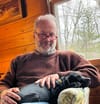Home
I was moved by a sense of adventure in a strange land, by calls to prayer drifting from loudspeakers in Arabic and Hebrew, by the beauty of Christian churches, Catholic, Greek Orthodox and Armenian

We are back from a ten-day trip to Israel with a church group pulled together from parishes in Boston, New York, and Nashville. The link between the churches is the priest who organized the trip back in 2021, just as we were hoping COVID was retreating, which it did not. The trip was pushed back until this year.
Most of our time was spent in Jerusalem, the sacred home of the world’s three great monotheistic religions, Judaism, Christianity, and Islam (in historical order). Approaching in our tour bus for the first time, we saw a city built into the hills, buildings and houses placed side-by-side in random close order, animated by Islam’s gold Dome of the Rock, the signature feature against a blue-gray landscape. We might have been approaching Philadelphia along the Schuylkill River, or Allentown, maybe. Or coming through Yonkers on our way into Manhattan. Dense, urban, made of limestone and cement, the ancient city splayed out to the farthest horizon.
The spiritual heart of a Holy Land pilgrimage, of course, is old Jerusalem, home to the Temple Mount, the place of the Dome, the Al-Aqsa Mosque, the Western Wall, and Church of the Holy Sepulcher. The old city is divided into four administered sections or quarters: respectively, the Muslim, Jewish, Christian and Armenian quarters.
Particular places are guarded by Israeli police or defense forces (IDF) or Arab police, most of whom look to be about eighteen and, when no one is looking, are checking their mobile phones. We went in and out of the West Bank during the trip, crossing zones A, B, or C, which delineate where Israeli Jews with passports or Palestinians with identity cards can travel. Steel and glass checkpoints with gates guard access to each zone. Except for the machine guns, it is like crossing the border into Canada.
Sharing news of our trip with people ahead of time, you could see expressions of worry cross their faces. It is not like telling people you are going to France. It is a place that relies on machine guns, after all, to help keep order at particular flashpoints. And for several weeks beforehand, Israeli streets had been clogged with protesters trying to head off the government’s plan to revise rules around their Supreme Court. We visited the Israeli Museum across from the seat of government, the Knesset, on a day when there were no protests. There was still a roadblock, inconveniencing drivers and causing delays to the extent that our cab driver was forced to let us off in front of the Knesset. It gave us the opportunity to walk to the museum, enjoy the warm, sunny day and the gardens on either side of the thoroughfare in full bloom.
We walked past one protest later in the week. About a dozen ultra-orthodox Jews shouting with bullhorns (they must keep them in the hall closet) across the street at a dozen Arabs who paid little attention. The children continued to chase each other around in circles on the lawns in front of their apartment buildings.
I prayed at the Western Wall, wading through the Jewish faithful, finding an open spot, unmolested—unacknowledged, really—observing young men clap each other on the back to say hello, passing the time of day as if they had bumped into each other at the market.
The next day we walked the Via Dolorosa, sharing the crowded alleyways with Muslim pilgrims on their way to the Al-Aqsa Mosque for the first day of Ramadan.
I was moved by a sense of adventure in a strange land, by calls to prayer drifting from loudspeakers in Arabic and Hebrew, by the beauty of Christian churches, Catholic, Greek Orthodox and Armenian. And by history.
People were helpful, though they struggled with English. But I always felt safe.
Then we got home. Some of us to New York, some to New England, and others to Nashville.
We got this email from one of our fellow pilgrims in Nashville: My daughter's family in Nashville attend church with one of the little girls who did not survive, and one of my daughter's best friends had a daughter in that classroom, but thankfully she survived.
We got this from another one: Two parishioners who teach at the Covenant School (including one of our life [sic] best friends…) work at the Covenant School and survived the shooting. They are deeply traumatized as you can imagine.
Finally: a friend (who teaches at the Covenant School, where the shooting occurred) tweeted: “I am safe, but not all right – not sure if I will ever be all right.”
I feel I know a little about why such terrible things happen in Israel. Religion gone wild. Zealotry. Tribal antagonisms dating to the time of the Canaanites. It is hard to regard the issues as excuses for slaughter in this age, but they do not exist in the shadows. Heading home, we were asked to pray for Jerusalem, this crux of conflict for so many, many years.
But I struggle to know why such terrible things happen in Nashville, Uvalde or other places in our country. In schools? Against children and teachers?
I know what the matter is with them. What is the matter with us?
We made a couple of friends in Jerusalem. I guess the thing to do is ask them to pray for Nashville—and Michigan State, Oakland, Half Moon Bay, Monterey Park, Enoch City, Huntsville . . .
Published in the Monadnock Ledger-Transcript, April 11, 2023

